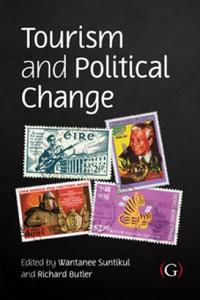Does tourism have a role in promoting peace on the Korean Peninsula?
Prideaux, Bruce, Prideaux, Jillian, and Kim, SeongSeop (2010) Does tourism have a role in promoting peace on the Korean Peninsula? In: Butler, Richard, and Suntikul, Wantanee, (eds.) Tourism and Political Change. Goodfellow Publishers, Woodeaton, Oxford, UK., pp. 189-198.
![[img]](https://researchonline.jcu.edu.au/16432/9.hassmallThumbnailVersion/16432_Prideaux_2010_Book_Cover.jpg)
|
Image (JPEG) (Book Cover)
- Cover Image
Download (24kB) |
|
|
PDF (Published Version)
- Published Version
Restricted to Repository staff only |
Abstract
[Extract] In recent decades the potential for global war has eased as Cold War rivalries have evaporated and been replaced by commercial and political competition. As political tensions have eased, domestic freedoms have increased to the point where citizens of the Russian Federation are free to travel abroad and in China an increasing number of citizens have access to independent overseas travel. A number of tourism researchers contend that tourism has been a major contributor to the development of peace, however, in the international relations literature the accepted view is that tourism has been one of the beneficiaries of peace, with development of bilateral tourism flows following, rather than preceding, the warming of relations between former protagonists (Bell and Kurtzer 2009; Calder 2006). This chapter focuses on the Korean peninsula. After reviewing the arguments made for and against the view that tourism has contributed to the development of peaceful relations, the chapter examines the situation with particular emphasis on the regional geopolitical situation in the first decade of the 21st century. The chapter argues that in the political manoeuvrings between the Democratic People's Republic of Korea (North Korea) and the Republic of Korea (South Korea) tourism has been used as a policy instrument in a wider political context that both states view as critical to the their future survival. In the South, tourism has been used as a component of policy objectives aimed at winning support amongst domestic constituents, while in the North it has been used to collect foreign currency and achieve specific international policy goals. The chapter concludes that when peace does eventually occur, tourism has the potential to become an important instrument for nation building in a future united Korea.
| Item ID: | 16432 |
|---|---|
| Item Type: | Book Chapter (Research - B1) |
| ISBN: | 978-1-906884-11-6 |
| Keywords: | South Korea, peace, reunification, tourism |
| Date Deposited: | 05 May 2011 04:06 |
| FoR Codes: | 15 COMMERCE, MANAGEMENT, TOURISM AND SERVICES > 1506 Tourism > 150601 Impacts of Tourism @ 100% |
| SEO Codes: | 90 COMMERCIAL SERVICES AND TOURISM > 9003 Tourism > 900399 Tourism not elsewhere classified @ 100% |
| Downloads: |
Total: 139 Last 12 Months: 3 |
| More Statistics |



